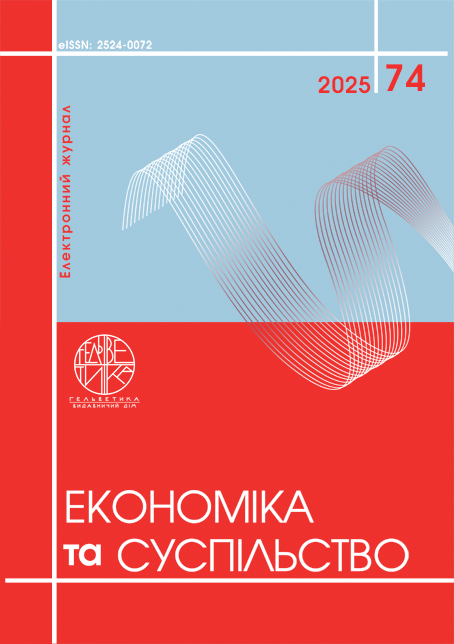EMOTIONAL CONTEXT OF ECONOMIC BEHAVIOR IN TIMES OF GLOBAL CHALLENGES
Abstract
The article examines the emotional context of economic behavior under conditions of global uncertainty, information overload, and institutional instability. The relevance of the topic lies in the growing inadequacy of rational choice models to explain the variability of real-life decisions in times of crisis and high informational complexity. The aim of the study is to conceptualize emotions as an integral component of economic choice that modifies perception, influences expectations, and shapes behavioral strategies. The methodological basis is logical-theoretical generalization and interpretive analysis of interdisciplinary literature, with particular attention to the dynamics of economic confidence in uncertain environments. The study identifies four key functions of emotions in economic behavior — signaling, heuristic, coordinative, and communicative — which serve as filters of stimuli, simplify decision-making under stress, align the actions of agents, and transmit implicit economic meanings. A central result is the identification of the dual nature of emotions: they simultaneously reflect external circumstances and shape economic reality through feedback mechanisms that influence demand, investment, and market dynamics. The article analyzes the phenomenon of economic sentiment as an aggregated emotional-cognitive formation capable of influencing macroeconomic indicators, often preceding objective changes. Using the case of Ukraine from 2021 to 2024, it is demonstrated how perceptions of war, institutional trust, and public narratives affected consumer and business confidence. The analysis shows that emotional reactions did not occur instantaneously, but rather emerged as a result of accumulated anxiety intensified by the information environment. The practical value of the article lies in the potential application of its findings to improve understanding of expectation formation mechanisms under crisis conditions, as well as in accounting for the emotional background in communication strategies of economic policy aimed at stabilizing sentiment and strengthening trust among economic agents.
References
Lehtinen A., Kuorikoski J. Unrealistic Assumptions in Rational Choice Theory. Philosophy of The Social Sciences. 2007. Vol. 37. Pp. 115-138. DOI: 10.1177/0048393107299684.
Simon H. A. (1957). Models of Man: Social and Rational.New York: Wiley. 287 p.
Cortes E.P., García J.P., Iribe-Burgos F., Guevara M., Hernandez G.M. Effects of emotional congruency and task complexity on decision-making. Cognitive processing. 2023. Vol. 24. №2. DOI: 10.1007/s10339-023-01129-1.
Канеман Д. Мислення швидке й повільне. Переклад із англійської. Київ: Наш Формат, 2017. 480 с.
Thaler R. Toward a positive theory of consumer choice. Journal of Economic Behavior & Organization. 1980. Vol. 1. №1. Pp. 39-60. DOI: 10.1016/0167-2681(80)90051-7.
Loewenstein G. Emotions in Economic Theory and Economic Behavior. The American Economic Review. 2000. Vol. 90, №2. Pp. 426-432. DOI: DOI: 10.1257/aer.90.2.426.
Simic G., Tkalcic M., Vukic V., Mulc D., Spanic E., Sagud M., Olucha-Bordonau F.E., Vuksich M., Hof P. Understanding Emotions: Origins and Roles of the Amygdala. Biomolecules. 2021. Vol. 11. №6. Pp. 1-58. DOI: 10.3390/biom11060823.
Shiller, R. J. (2019). Narrative Economics: How Stories Go Viral and Drive Major Economic Events. Princeton University Press. 400 p.
Barsky R., Sims E. Information, Animal Spirits, and the Meaning of Innovations in Consumer Confidence. American Economic Review. 2012. Vol. 102. №4. Pp. 1343-1377. DOI: 10.1257/aer.102.4.1343.
Державна служба статистики України. Індикатор економічних настроїв. URL: https://www.ukrstat.gov.ua/operativ/operativ2022/fin/opd_ek/ien/arh_ien_u.htm (дата звернення: 30.03.2025).
Edelman Trust Barometer. Global Report 2024. Available at: https://www.edelman.com/sites/g/files/aatuss191/files/202402/2024%20Edelman%20Trust%20Barometer%20Global%20Report_FINAL.pdf (accessed March 29, 2025).
Lehtinen A., Kuorikoski J. Unrealistic Assumptions in Rational Choice Theory. Philosophy of The Social Sciences. 2007. Vol. 37. Pp. 115-138. DOI: 10.1177/0048393107299684.
Simon H. A. (1957). Models of Man: Social and Rational. New York: Wiley. 287 p.
Cortes E.P., García J.P., Iribe-Burgos F., Guevara M., Hernandez G.M. Effects of emotional congruency and task complexity on decision-making. Cognitive processing. 2023. Vol. 24. №2. DOI: 10.1007/s10339-023-01129-1.
Kahneman D. (2017). Myslennia shvydke y povilne [Thinking, Fast and Slow]. Kyiv: Nash Format, 480 p. (in Ukrainian).
Thaler R. Toward a positive theory of consumer choice. Journal of Economic Behavior & Organization. 1980. Vol. 1. №1. Pp. 39-60. DOI: 10.1016/0167-2681(80)90051-7.
Loewenstein G. Emotions in Economic Theory and Economic Behavior. The American Economic Review. 2000. Vol. 90, №2. Pp. 426-432. DOI: DOI: 10.1257/aer.90.2.426.
Simic G., Tkalcic M., Vukic V., Mulc D., Spanic E., Sagud M., Olucha-Bordonau F.E., Vuksich M., Hof P. Understanding Emotions: Origins and Roles of the Amygdala. Biomolecules. 2021. Vol. 11. №6. Pp. 1-58. DOI: 10.3390/biom11060823.
Shiller, R. J. (2019). Narrative Economics: How Stories Go Viral and Drive Major Economic Events. Princeton University Press. 400 p.
Barsky R., Sims E. Information, Animal Spirits, and the Meaning of Innovations in Consumer Confidence. American Economic Review. 2012. Vol. 102. №4. Pp. 1343-1377. DOI: 10.1257/aer.102.4.1343.
Derzhavna sluzhba statystyky Ukrainy. Indykatоr ekonomichnykh nastroiv [State Statistics Service of Ukraine. Economic Sentiment Indicator]. Available at: https://www.ukrstat.gov.ua/operativ/operativ2022/fin/opd_ek/ien/arh_ien_u.htm (accessed March 30, 2025).
Edelman Trust Barometer. Global Report 2024. Available at: https://www.edelman.com/sites/g/files/aatuss191/files/2024-02/2024%20Edelman%20Trust%20Barometer%20Global%20Report_FINAL.pdf (accessed March 29, 2025).

This work is licensed under a Creative Commons Attribution 4.0 International License.


